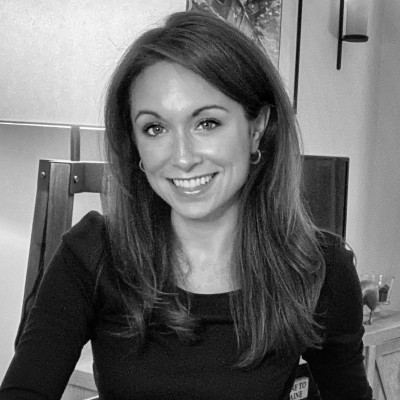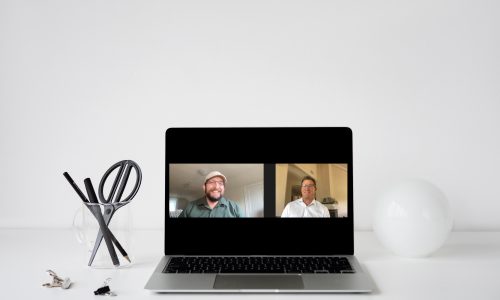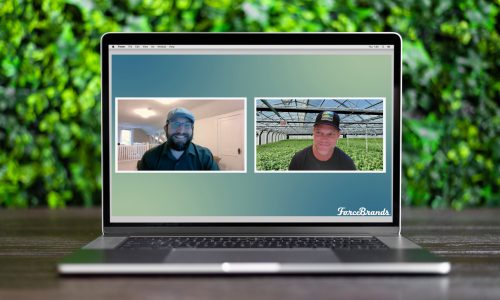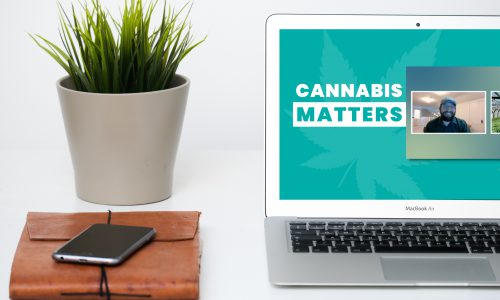As one of the only cannabis-infused beverages on the market that’s targeted to women, Happi is uniquely positioned in the industry. In this episode of Cannabis Matters, we go behind the scenes of the company with its president Lisa Hurwitz, who’s bringing her experience in big CPG and at MSOs to the cannabis startup space.
ForceBrands‘ Cannabis Client Strategist and host of Cannabis Matters, Eric Rosen, catches up with her as she chats about the future of cannabis, leveraging data to drive Happi’s strategy, and more.
Watch our exclusive interview and read the full transcript below.
Eric Rosen: Welcome to Cannabis Matters. We’ve got Lisa Hurwitz today. Lisa is President of Happi, an infused sparkling beverage brand. Thanks for carving out the time to meet with us Lisa.
Lisa Hurwitz: Eric, it’s great to be here. Thanks so much for having me.
ER: You have an interesting background in that you’ve done a lot outside of cannabis and now you’re doing a lot inside of cannabis. So I’m curious how your background running brand portfolios for big CPG companies like Procter & Gamble really prepared you for your current role as well as the trajectory leading up to it.
LH: Yeah, it’s a great question Eric and prior to my role as the President of Happi, I was the Chief Marketing Officer of Grassroots Cannabis, which was purchased by Curaleaf so it’s been exciting to be in sort of all parts of the cannabis industry over the past three and a half years. CPG is a great proxy for cannabis. It was a great experience. I think a lot of things I learned growing up in the CPG industry focus on the consumer so I think that’s something the whole cannabis industry can learn and it’s something we’ve really taken to heart with Happi, which is who is your core consumer and building a product portfolio and a brand around that consumer. I think today there is a current consumer in the cannabis market, often someone who is much more comfortable going into a dispensary, more comfortable with higher doses of THC, but the future of cannabis I certainly believe and I think many others do as well is going to be in this more microdose space. It’s going to be more easily accessible products for that kind of ‘canna curious’ consumer who today might not be comfortable you know smoking a joint or a bowl or even vaping, and edibles even are a tough experience as well because the onset time is typically so long that people don’t know what to expect out of an edible so beverage is really an exciting kind of area.
In terms of other areas of CPG beyond just sort of the consumer side and the brand, the whole manufacturing process and distribution process in CPG is really similar to what we’re seeing in cannabis now. It’s just on a state-by-state scale versus you know being able to scale kind of worldwide like consumer packaged goods but things like best manufacturing processes, documenting all your SOPs and quality control, how do you distribute, how do you package a product up, test it, and then you know distribute it throughout a state, those are many of the same challenges I think that CPG companies have in their manufacturing and operational processes so a lot of that is really carried over into the cannabis space as well.
ER: From a positioning standpoint, where does Happi sit in the marketplace as related to all the other numerous beverage companies that are on the market today?
LH: Yeah, so I know, Eric, you’re a recent SoCal guy. I actually interestingly enough have never spent a whole lot of time in the cannabis space in California. I’ve probably worked in most other states outside of California so the bulk of the beverages today are concentrated in California. Happi is really the only beverage on the market or one of the few that is targeted toward women, toward that ‘canna curious’ consumer who wants to be able to experience THC potentially for the first time and so it’s actually formulated without CBD and that was done largely because we got a lot of feedback from consumers that they just want to understand their THC tolerance. They may be taking CBD in other form factors. They’ve used CBD beverages before but they don’t know how THC is going to affect them and they want a safe and easy way to try it and with beverages you know the onset is anywhere from 12 to 15 minutes, the flavors are amazing, it’s incredibly low-calorie, all natural, vegan. We really formulated Happi with this female consumer in mind so we’re excited that we have a product that we believe can be someone’s first try, or first on-ramp into cannabis.
ER: I did a little bit of research on just some of the work that you’ve done to date and it really sounds like you as a marketer, as a business leader, you’ve really leveraged data to come up with really data-driven strategies around everything related to the consumer at the core of the product and the product experience, so I’m curious how are you currently leveraging data-driven strategies for Happi, for customer acquisition, for retention, to continue the journey along with the customers sort of before, during, and after they’ve experienced the product?
LH: In terms of data, it’s challenging when you’re not vertical. So I was used to being in an MSO environment where you’re seeing your sales data come through, you know exactly what’s selling in your dispensaries so we’re working with a lot of third parties to understand sell-through data. Obviously, I think loyalty is huge in the cannabis space. We have a few super consumers already so one of the things we’ve been doing is reaching out to those consumers. We had someone buy 64 packs in a setting at one purchase, which is pretty exciting, to store them and you know be able to gift them and all sorts of things. And so just learning when you’re a startup, and again this is different a bit than my MSO or my big CPG experience, you can try a whole lot of new things and I would tell you Eric that’s what we’re doing. It’s a lot of testing and learning. So understanding how our consumers are buying, what are they buying for, we’re in about 50 dispensaries so far in Michigan which is a nice number to see. Experimenting with media, doing a lot of like geo-targeting, which we get to do being in a single state right now and really just sort of looking at purchase behavior of our consumers. Engagement, media consumption, and then engaging like our core consumers around kind of further use cases, test and learn development, things like that.
ER: I’m curious what you’re seeing from a trend standpoint with infused beverages.
LH: Yeah it’s a great question. So as I mentioned I think right now it’s such a new category and it’s so small. You get a state like California and you’re gonna really be able to see you know obviously with some of our competitors out there there’s definitely more fast adoption than there has been over the past few years but again I look at like the broader landscape of what’s going on in the alc-bev landscape and in the sort of non-alcoholic beverages and you’re seeing a couple things. Number one is there was a lot of drinking during the pandemic. I think a lot of people became much more aware, women in particular, of their alcohol habits so you’re seeing ‘dry January’ was very big this year. You’re seeing this sort of sober curious movement, people move away from, especially the younger generations, I mean I think we thought our target consumer for Happi was going to be 40 and above and we’re seeing a lot more younger consumers come into the category because they’re just less interested in alcohol I think than older consumers. They haven’t grown up with it as much, they don’t like the hangover, they don’t like the way it makes them feel, so I think on a macro level you’re seeing kind of a movement toward ‘sober curious’ or away from regular drinking, which is great and then on the sort of more traditional kind of beverage side like sparkling water etc., the functional beverage market is just exploding with ingredients you know reishi mushrooms and tons of adaptogens and things like that, which is really exciting. And where I think we’re going to see the cannabis beverage market move and where Happi is working on our innovation pipeline now is combining that with all of the opportunities that the cannabis plant gives you.
ER: What are you seeing with respect to research on the entourage effect with ingestibles, with beverages, versus inhalation which we know exists. Is that happening within the beverage world?
LH: The research that’s been done largely on CBD-infused beverages from an entourage effect. CBD plus THC, which is the bulk of what’s out there, versus either THC alone or THC with some other minor cannabinoids, there is less of an entourage effect when you put CBD in there actually, which is interesting. There is less bioavailability, the sum of the parts, it lowers the THC effect so if you have five to ten milligrams, it may feel like it’s two to three if you add CBD in there so it’s an interesting balance because I was always taught in the industry as you said, one plus one equals three. If you add in certain terpene profiles or certainly CBD plus THC, I think that’s the most commonly used equation in terms of the entourage effect, equals something much greater than just CBD plus THC or whatever that milligram count is, and I think in beverages at least the early research that we’ve seen actually counters that and says no, no, no THC becomes less bioavailable at least with CBD. Now we haven’t done enough research to look at some of these other minor cannabinoids or terpene profiles and how those would affect them.
ER: Lisa, let’s shift gears for a moment and apply the topic of the concept of the entourage effect to organizations. How is the candidate-driven market today and Covid really affected the way you’re hiring, and especially at the upper altitude of the organization on the leadership role front?
LH: It’s a great question. I would say I know hiring overall for MSOs, for a lot of companies these days is challenging. I think you’re looking at candidates with multiple offers. I will tell you as a startup and this is new for me, I’ve never worked for a startup in my career. One of the tricky things is you don’t always have the same like base salary you get to offer new candidates so you’re playing with things like equity and you really have to find believers. You have to find those that really want to jump in. I will tell you I have seen an uptick in the pandemic of people wanting to leave big corporate America and do something different, so that’s benefiting companies like Happi who you know have something to offer. Remote work, you can work from anywhere in the world as evidenced by me. You have opportunities to actually be part of something, to be part of the growth. I think people are reevaluating what their needs and wants are from their careers, which is exciting.
We have the benefit of hiring very selectively and for a couple of key positions. I found the most effective way to do that is through word of mouth — personal referrals from within the cannabis network.
I think we’re also seeing people move around in the cannabis space a lot which, wasn’t happening a few years ago. It was so new that everybody kind of went to the MSOs. Now we’re seeing people shift from MSOs to brand companies, brand companies to MSOs. There’s a lot of movement even within the cannabis space and I’m encouraged because most of the people I’ve worked with and talked to want to stay in cannabis and so I think that’s a good sign that they believe in the future of the industry and think there’s a lot of opportunities still to be had.
ER: You mentioned something interesting about shifting from MSOs to startups, and startups to MSOs. These really fall under the heading of what I consider to be inflection points in the industry from a paradigm shift standpoint, and since you’ve entered the industry, I’m curious what the most interesting inflection point that you’ve seen at the industry level and then also maybe at the company level, either at Grassroots or at Happi that maybe you had a part in championing?
LH: I’ve kind of been on both sides of it, both from an MSO and brand perspective but also from, I think in even a year, you look at the capital markets in the cannabis space a year ago, you look at where the MSOs were, and it was very high flying. There were a lot of reasons for that, so I was incredibly grateful and really enjoyed my time at Grassroots and felt like being able to go from a handful of dispensaries in the state of Illinois to 12 states, obviously an incredible exit with Curafleaf. The inflection point there was cannabis just felt like a runaway train. It felt like it was unstoppable. New states, more dispensaries, opening more grows, more cultivation. Capital has always been a constraint but there was more capital in the market because cannabis was kind of new. And then I think much like you’ve seen in other industries, dot-com, I, earlier in my career in advertising, was part of that, you saw sort of a market correction and I think we’re in an inflection point right now where there’s a bit of a market correction happening in cannabis. I think obviously you’re seeing that in the public markets but I think you’re also seeing it in that like there’s a lot of questions around when is legalization going to happen? Is the Safe Banking Act going to get passed? When are we going to be able to see more capital come into the markets? What is the future of brands? So I think you’re seeing another inflection point here where the MSOs have very large footprints and they are vertical and they are really truly manufacturers at this point. I think you’re seeing more and more branded companies like Happi come up and their focus is different, their focus is on the consumer, their focus is on product innovation pipeline, their focus is on brand, and so I think you’re going to see those two things eventually sort of start to come together. You’re going to see the infrastructure that the MSOs have built, which is really impressive, and then you’re going to see the focus on brand and consumer and product innovation potentially come in through a different lens like individual brands or even maybe some single-state operators that are doing some innovative things. So I think there’s definitely a lot of inflection points even in a very condensed period of time in the cannabis space.
ER: And on the forward-looking front, what is your take on federal legalization from a timeline standpoint. Is it going to happen? Is it going to be decriminalization, rescheduling, descheduling, if you had to guess, what do you think that’s going to look like?
LH: Oh that million-dollar crystal ball question. I think we’re going to see the Safe Banking Act come first. I feel pretty clear on that. I don’t know when obviously. I think we all had hoped it would be before the midterms this year in 2022. There’s a lot right now on the administration’s plate given what’s going on in the state of the world with the pandemic and the war and everything else, but I do think the first entry point will still be the Safe Banking Act. I think that’s going to create a floodgate of capital into the industry. I think it’s going to help the industry tremendously. As far as full-scale legalization, I think we’re years out from that. I do. I think there’s a lot that needs to get worked out with social justice and social equity and how that plays into full-scale legalization. I think that the states right now with their tax revenue, it’s very complicated. So I’m hopeful I would say and optimistic maybe we could see safe banking within the next year or so, maybe even before the midterms and then legalization beyond that.
ER: Lisa, thank you so much for being with us here today.
LH: Yeah, you’re welcome Eric. This is my pleasure. This was a lot of fun. Thank you for having me.
Watch more episodes from Cannabis Matters here.
Interested in learning more about the cannabis industry and how ForceBrands’ cannabis practice can help grow your business or career? Reach out to Eric Rosen to start the conversation.






